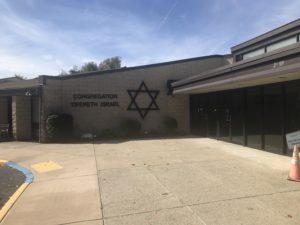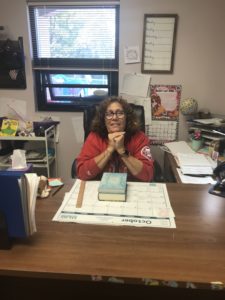
 On Rosh Hashanah and Yom Kippur this year, Congregation Tifereth Israel in Bensalem set up 140 seats.
On Rosh Hashanah and Yom Kippur this year, Congregation Tifereth Israel in Bensalem set up 140 seats.
Sixty-two percent of members said they planned on coming into the building for the High Holidays, but synagogue President Jacki Cohen still wasn’t sure what to expect.
She thought the temple might be “out of sight, out of mind” for people in the wake of COVID. They had spent so much time away and doing services on Zoom.
But on the first day of Rosh Hashanah “we were filled to capacity,” CTI Rabbi Jeff Schnitzer said. Then on Yom Kippur, the main service of the day was “standing-room only,” he added.
“I think the need for people to reconnect after being separated for so long; I think it is a prime motivation,” the rabbi said.
Before COVID, Congregation Tifereth Israel’s membership base dropped from 250 to less than 130, according to congregants. But over the past two-and-a-half years, it has gone back up a little.
In August 2020, the building reopened after a five-month pandemic closure, and CTI’s nursery school had 24 kids. For the 2022-’23 school year, it is up to 100. Many of them are from non-Jewish Bensalem families who just need a preschool, but their enrollment nonetheless helps the temple, explained Cindy Citron, its educational director.
Citron also mentioned that in 2017, CTI’s Hebrew school had maybe 10 or 12 students. Today, though, it is up to 48.

“It’s growing,” she said. “And most of the kids in the Hebrew school right now came through the preschool. So the preschool does serve as a feeder.”
Congregants also have started to come back out for Shabbat. CTI’s hybrid services, in person and on Zoom, can draw 30 or more people, according to Cohen.
Schnitzer, 67, a Levittown resident, joined the synagogue in 1979 as a member, staying until 1985. Then he came back in 1995 as a congregant in time for his daughter’s bat mitzvah. Finally, in 1998, he became the temple’s spiritual leader.
He believes that, over all of that time, the synagogue has felt like a family. When he’s talking to a prospective congregant, Schnitzer explains that members “fight like family,” he said. But then he says that, “When something happens, we celebrate and grieve together.”
It’s this feeling that has kept Tifereth Israel alive, according to the rabbi. It’s also a desire for this feeling that is bringing some new people in post-COVID.
Going shopping or to an event can create connections with other people. But it’s not quite the same as going to synagogue together, Schnitzer said. “It’s not a personal kind of connection that you get in a synagogue like ours,” he said. “We look at our community as family and not as members.”